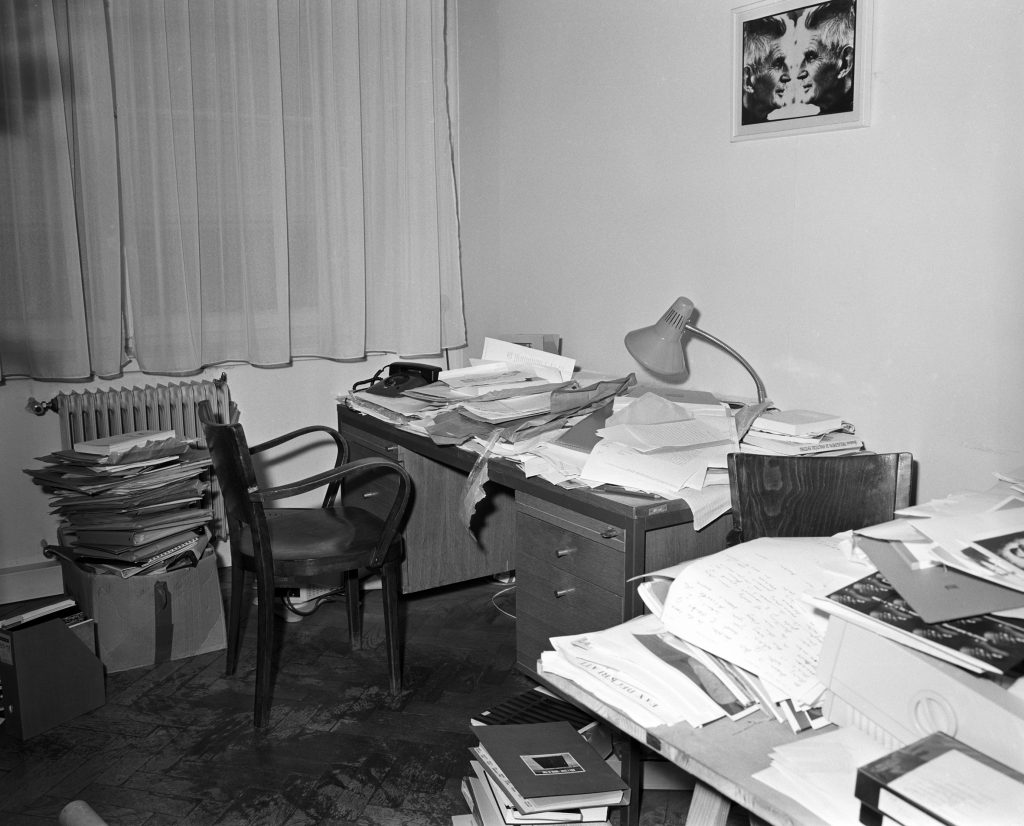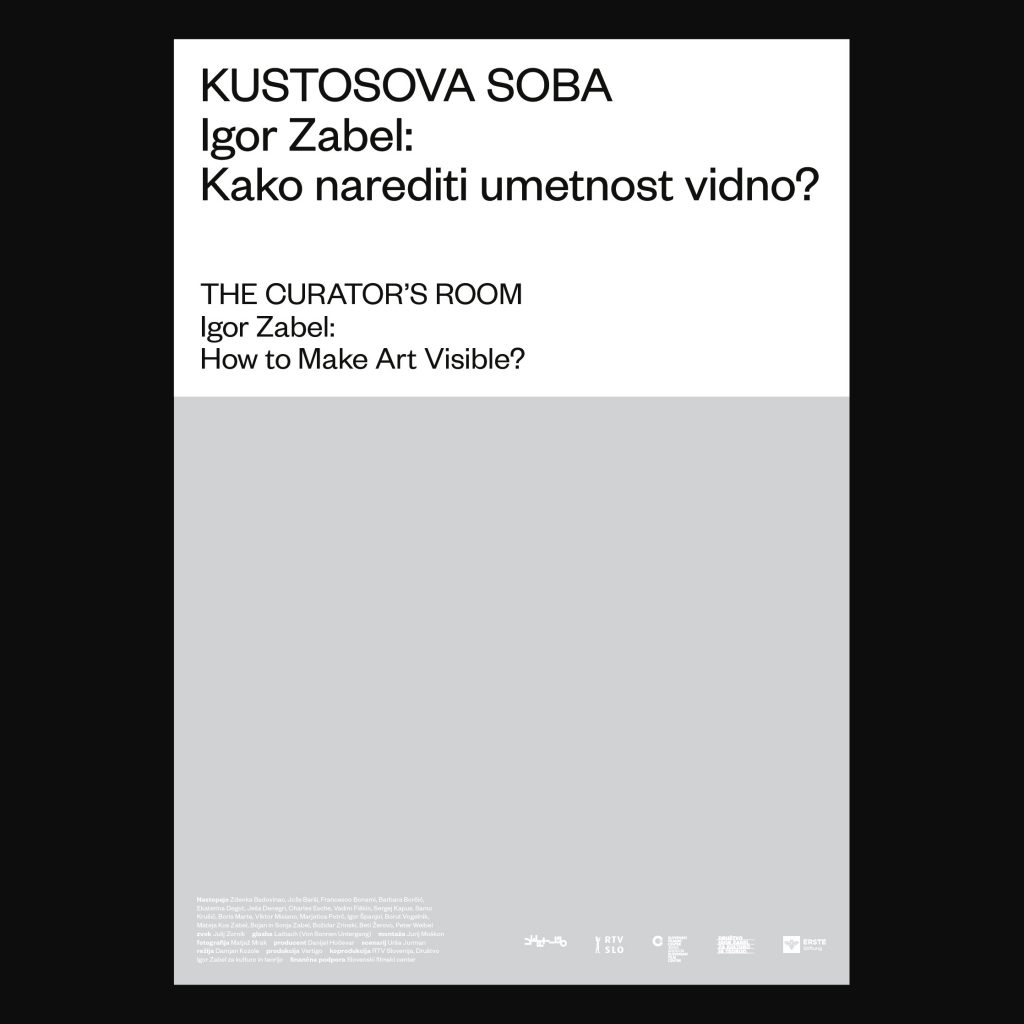Date: October 19th 2019
Time: 18:00
Venue: Salon of the Museum of Contemporary Art (14 Pariska Street) Belgrade

WCSCD as part of 2019 program in collaboration with Igor Zabel Association for Culture and Theory is proud to premiere the documentary dedicated to Igor Zabel in Serbia . Film Screening will be followed by a conversation between film scriptwriter Urska Jurman, Zoran Eric, Misko Suvakovic, Biljana Ciric
The Curator’s Room, a documentary film dedicated to the art historian and curator Igor Zabel (1958–2005), focuses on Zabel’s work in the field of fine arts from the end of the 1980s to his death. Through the film, we learn how, in that epochal time – at the turn of the century and on the intersection of (post)modern and contemporary art, the local and international art space, socialism and capitalism, East and West, artistic and social/political –, he faced in his work not only great changes and conflicts, but also possibilities for the new.
The film portrays not only a man who, despite the internal contradictions of the art world, persistently believed in the power of art, but also the time and space in which Igor Zabel worked and which he co-shaped.
About the film
director: Damjan Kozole

As an art historian and curator at the Museum of Modern Art in Ljubljana, Zabel importantly contributed to an adequate historical placement of artistic phenomena such as historical avant-gardes (Tank!, 1998) and neo-avant-gardes (OHO: Retrospective, 1994), but also contemporary artistic practices. In Slovenia, he was one of the key art historians who defined contemporary art as a specific art practice and importantly contributed to its establishment, also in the international context (Manifesta 3). In addition, he always incisively reflected on the conditions in which contemporary art emerged.
In his work, Igor Zabel constantly emphasised the significance of context. In
turn, the film contextualises his work – from the changing geopolitical context
and accelerated globalisation to the changing institutional framework of art
production, including the role of curators.
The documentary tells of his concept of the curator’s role, his key exhibition projects and their backgrounds, his interventions into Slovenian art history, his literary works and the texts with which he importantly co-created the reflection on the relation between the (former) East and West as it was manifested in the field of art after the fall of the Berlin Wall.
In his theoretical and curatorial work, he advocated an in-depth consideration of the political and social sub-currents that can contribute to a better understanding of art and, at the same time, insisted on the capability of art to tease apart the very substrata that so importantly determine it. His interest in researching the complex relations between the social and the artistic was also the basis of Individual Systems, an exhibition he prepared for the 50th Venice Biennale (2003), which inaugurated him as a referential international curator.
Author’s Statement
“When
Igor Zabel died in 2005, I was abroad. I opened my computer and saw a
black-and-white photo of him on a portal. His sudden and unusual death
resounded among all of us who work in art. This is not merely a film about Igor
Zabel, but also a film about a time that brought essential shifts in the
understanding and evaluation of art in the context of great social and
political changes. In addition to the reflection on Zabel’s heritage, the film
includes important documents that tell us how contemporary art was born and
established in Slovenia and Eastern Europe.”
Damjan Kozole
About the Author
Damjan Kozole (born 1964 in Brežice, Slovenia) is an award-winning Slovenian filmmaker whose directing credits include nine feature narrative films: The Fatal Telephone (1987), Remington (1988), Stereotyoe (1997), Porn Film (2000), Spare Parts (2003), Labour Equeals Freedom (2005), Forever (2008), Slovenian Girl(2009) and Nightlife (2016) as well as feature documentaries The Birth of Lear (1993), Long Vacation (2012) and Project Cancer (2013).
His films received several awards and nominations: Spare Parts was nominated for the Golden Bear at Berlinale and ranked by Sight & Sound in 2008 among ten most important films of the New Europe, worldwide released Slovenian Girl premiered in 2009 at Toronto, Pusan and Sarajevo IFF, while Nightlife received Crystal Globe for Best Director at Karlovy Vary IFF.
In 2005, a retrospective of Kozole’s feature films took place in USA and Canada, hosted by the American Film Institute. He’s a member of European Film Academy.
Film duration: 64 min
About participants:
Urška Jurman Graduated at art history and sociology of culture from the Faculty of Arts in Ljubljana. She works as an editor, curator, and art writer in the field of contemporary arts. Since 2012 she has been working as a programme manager of Igor Zabel Association for Culture and Theory. USɅ
Miodrag Šuvaković publishes under the name Miško Šuvaković. He received his PhD from the Faculty of Fine Arts at the University of Art in Belgrade in 1993. He has been a professor of appalied aesthetics, Faculty of Music in Belgrade (1996-2015). He is a professor of applied aesthetics & theory of art and media, Faculty for Media and Communications, Belgrade. He is a member of Slovenian Society of Aesthetics and Society for Aesthetics of Architecture and Visual Arts Serbia. He is President of the International Association for Aesthetics (IAA). Šuvaković was a member of the conceptualist Group 143 (1975-1980), a member of the informal theoretical community “The Community for Researching Space” (1982-1989) and member of the theoretical-performing organisation “Walking Theory” (2000-to the present), as well as a follower of the new media and performance artistic and designer platform PSE (Provisonal Salta Ensemble, 2008-to the present). He has published or edited 50 books in Serbian, Slovenian, Croatian and English.
BILJANA CIRIC is a founder of educational platform What Could Should Curating Do
She was the co-curator of the 3rd Ural Industrial Biennale for Contemporary Art (Yekaterinburg, 2015), curator in residency at Kadist Art Foundation (Paris, 2015) and a research fellow at Henie Onstad Kunstsenter (Høvikodden, 2016).
Her recent exhibitions include An Inquiry: Modes of Encounter presented by Times Museum, Guang Zhou(2019), When the Other Meets the Other Other presented by Cultural Center Belgrade (2017),Proposals for Surrender presented by McAM in Shanghai(2016/2017_, and This exhibition Will Tell You Everything About FY Art Foundations in FY Art Foundation space in Shen Zhen(2017).
In 2013, Ciric initiated the seminar platform From a History of Exhibitions Towards a Future of Exhibition Making with focus of China and Southeast Asia. The assembly platform were hosted by St Paul St Gallery, AUT , New Zealand(2013), Rockbund Art Museum, Shanghai( 2018), Times Museum, Guang Zhou( 2019)and the project will be finalized in the book published by Sternberg press in 2019
Her research on artists organized exhibitions in Shanghai has been published in the book History in Making; Shanghai: 1979-2006 published by CFCCA, Life and Deaths of Institutional Critique co-edited by Nikita Yingqian Cai and published by Black Dog Publishing among others.
She was nominated for ICI Independent Vision Curatorial Award (2012) Currently she is developing long term project reflecting on China’s Silk and Road Initiative titled:As you go . . . the roads under your feet, towards a new future and how its will change local living rituals, aesthetics and connectivity.
The event is made possible with the support of Igor Zabel Association for Culture and Theory
The event is free and open to the public.
The WCSCD curatorial course and series of public lectures have been initiated and organized by Biljana Ciric.

